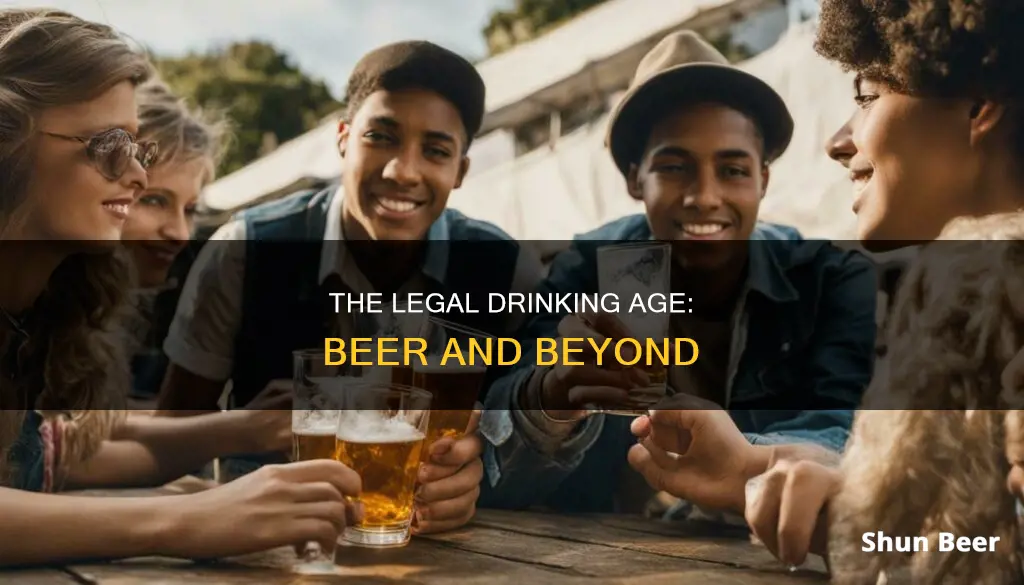
The legal drinking age is the minimum age at which a person can legally consume alcoholic beverages. The laws vary between countries, and within countries, with some nations having no minimum age for alcohol consumption. The majority of countries have a minimum legal drinking age of 18, while others have an age limit of 19 or 21. In some countries, the minimum age to drink alcohol differs from the age at which it can be purchased.
In the UK, for example, it is illegal for anyone under the age of 18 to buy alcohol. However, it is not illegal for someone between the ages of five and 17 to drink alcohol at home or on private premises. In the US, the minimum legal drinking age is 21, one of the highest in the world. In Canada, the drinking age varies by province, with most setting it at 19, while Alberta, Manitoba, and Quebec have a minimum age of 18.
What You'll Learn

Drinking laws in the UK
In the UK, the law states that no one under the age of 18 can buy alcohol, and adults cannot buy it for them. The only exception is for 16 or 17-year-olds who are allowed to drink (not buy) beer, wine, or cider with a meal if accompanied by an adult. This exception does not apply in Northern Ireland. It is illegal for people under 18 to drink spirits in a pub anywhere in the UK, even with a meal.
The UK's Chief Medical Officers recommend that an alcohol-free childhood is the healthiest option. This means no alcohol until at least the age of 15, and only very small amounts between the ages of 15 and 18, and never more than once a week. This is because alcohol can cause serious and long-lasting damage to young people whose bodies are still developing.
Under-18s can be stopped, fined, or arrested by the police for drinking alcohol in public. The police also have the power to confiscate alcohol from under-18s drinking in public spaces, such as in the street or in parks.
The sale of alcohol in the UK is restricted to licensed premises, including pubs, restaurants, and shops. The authority to sell alcohol is divided into two parts: the Premises Licence, which prescribes the times and conditions under which alcohol can be sold, and a Personal Licence, which allows individuals to sell alcohol or authorise its sale by others.
In England, Scotland, and Wales, it is not illegal for someone between the ages of five and 17 to drink alcohol at home or on other private premises. However, it is illegal to give alcohol to children under the age of five.
Beer Drinking in Abu Dhabi: What's the Deal?
You may want to see also

Drinking laws in the US
Federal Laws
The primary federal law governing alcohol policy is the 21st Amendment, which repealed national prohibition. This amendment gives states control over whether to allow the sale and importation of alcohol, as well as how it is distributed and possessed within their borders.
The Federal Uniform Drinking Age Act of 1984 sets the minimum legal drinking age at 21 across all states. This Act allows the federal government to withhold 10% of federal funding for highways from states that do not prohibit people under 21 from buying or publicly possessing alcohol.
State Laws
State laws can vary significantly when it comes to alcohol regulation. While all states abide by the minimum drinking age of 21, they may have different laws regarding possession and exceptions to the law. For example, some states allow people under 21 to drink with their parents' permission, for religious purposes, or for medical reasons.
States also have the power to decide whether to allow the sale of alcohol within their borders and how it will be distributed. Some states are "control" states, where the government controls the wholesale retail of distilled spirits, wine, and beer. In these states, there may be state-owned or state-designated liquor stores.
Local Laws
Some states allow local communities to set or enforce certain rules about who can buy, sell, own, or drink alcohol. For example, "blue laws" are local laws designed to limit what people can do on Sundays, and they often restrict alcohol sales. These laws vary from state to state, with some states repealing them entirely, while others still uphold them.
Other Considerations
In addition to age restrictions, drinking laws in the US also cover areas such as:
- How much alcohol a person must consume to be considered intoxicated (Blood Alcohol Concentration or BAC)
- Selling or giving alcohol to minors
- Punishments for breaking alcohol laws or committing alcohol-related crimes
- Whether alcohol can be sold in grocery stores or only in liquor stores
- Restrictions on "happy hours" or discounted drinks
Drinking Beer While on Naltrexone: What You Need to Know
You may want to see also

Drinking laws in Europe
Drinking laws vary across Europe, and it's important to familiarise yourself with the specific guidelines of each country you plan to visit. While the US has a uniform drinking age of 21, the legal drinking age in Europe ranges from 15 to 20, with most countries setting it at 18.
Drinking Age in Europe
In Germany, which has one of the lowest drinking ages in Europe, youth can drink undistilled alcohol like wine or beer from the age of 14 when accompanied by an adult. At 16, they can drink these beverages without an adult, but they must be 18 to consume spirits. In the UK, 15-year-olds can consume alcohol on private property, and at 16, they can drink beer, wine, or cider with meals when purchased by an adult. At 18, they can drink in public and buy alcohol. In Sweden, you can drink alcohol at home at any age, but you need to be 18 to order it in a restaurant or bar and 20 to purchase it. Spain, Switzerland, Luxembourg, Liechtenstein, Gibraltar, Denmark, and Cyprus have a drinking age of 16, while Greece, Malta, and Lithuania require individuals to be 17. The drinking age in France, Ireland, and most other European countries is 18.
Drinking in Public
While drinking laws vary across Europe, some countries have unique provisions. For example, in Rome, Italy, drinking alcohol in groups of three or more in public is prohibited. In Germany, drinking in public is permitted, but cycling under the influence is forbidden, and violators may be sent for a psychological evaluation. In Budapest, Hungary, alcohol cannot be purchased near schools or churches, and drinking in streets, parks, educational institutions, or on public transport is prohibited. Prague, Czech Republic, is known for its laid-back drinking culture, but certain streets have strict no open container laws. In Scotland, it is illegal to drink while in charge of a cow, horse, or steam engine.
Drinking and Driving
Europe generally has stricter drunk driving laws than the US. For example, in Germany, there is zero tolerance for new drivers, and the blood alcohol limit is much lower than in the US. France has different limits for new and experienced drivers, with the former having a limit of 0.02% and the latter 0.05%.
Did the Gang Drink Beer or Not?
You may want to see also

Drinking laws in Asia
For example, in Thailand, the legal drinking age is 20, but this is rarely enforced, especially for tourists. Beer gardens run by parents are a common sight, and young children can be found serving alcohol. In contrast, Singapore has strict laws banning the consumption and sale of alcohol from 10:30 pm to 7 am island-wide. Other countries with similar bans on public drinking during specific times include Indonesia, the Philippines, and Thailand.
Some countries in Asia have unique circumstances that affect their drinking laws. For instance, in Muslim-majority countries like Brunei and Indonesia's Aceh province, alcohol is prohibited or strictly regulated. On the other hand, in Cambodia, alcohol sales are a significant part of the economy, and the government actively promotes drinking as part of the culture.
The legal drinking age in Asia also varies significantly, with some countries setting the limit as low as 16 and others at 21 or even 25. The majority of countries, however, have a minimum legal drinking age of 18. A few countries, like Thailand and India, have recently increased their drinking age from 18 to 20 and 18 to 21 or 25 (varying by region), respectively.
Overall, the drinking laws in Asia demonstrate a diverse range of approaches to regulating alcohol consumption, influenced by cultural, religious, and social factors. While some countries take a more permissive approach, others enforce strict laws or bans to control alcohol consumption within their borders.
Healthy Beer Choices: Calorie-Conscious Drinking
You may want to see also

Drinking laws in Africa
Drinking laws vary across the African continent. The most common minimum age to purchase alcohol in Africa is 18 years old. However, in some countries, the legal drinking age is different for tourists and non-Muslims.
In Angola (except Luanda Province), the Central African Republic, Comoros, Equatorial Guinea, Guinea-Bissau, and Mali, there are no laws restricting the sale of alcohol to minors. In Libya, Somalia, and Sudan, the production, sale, and consumption of alcohol are prohibited.
In South Africa, the legal drinking age is currently 18 years old, but there is a bill in front of the cabinet, awaiting approval by parliament, to change the legal drinking age to 21. This is due to South Africa being in the top 20 biggest drinking countries in the world, with more than a quarter of the drinking population considered binge drinkers. The new law would also ban alcohol advertising on radio and television between 6 am and 10 pm.
Beer Distribution in Pennsylvania: A Unique System
You may want to see also
Frequently asked questions
The legal drinking age in the United States is 21.
In Puerto Rico and the US Virgin Islands, the legal drinking age is 18.
The drinking age in Canada varies by province, with most provinces having a minimum age of 19. However, in Alberta, Manitoba, and Quebec, the drinking age is 18.
The drinking age in the UK is 18. However, 16 and 17-year-olds are allowed to drink beer, wine, or cider with a meal in licensed premises when accompanied by an adult.







